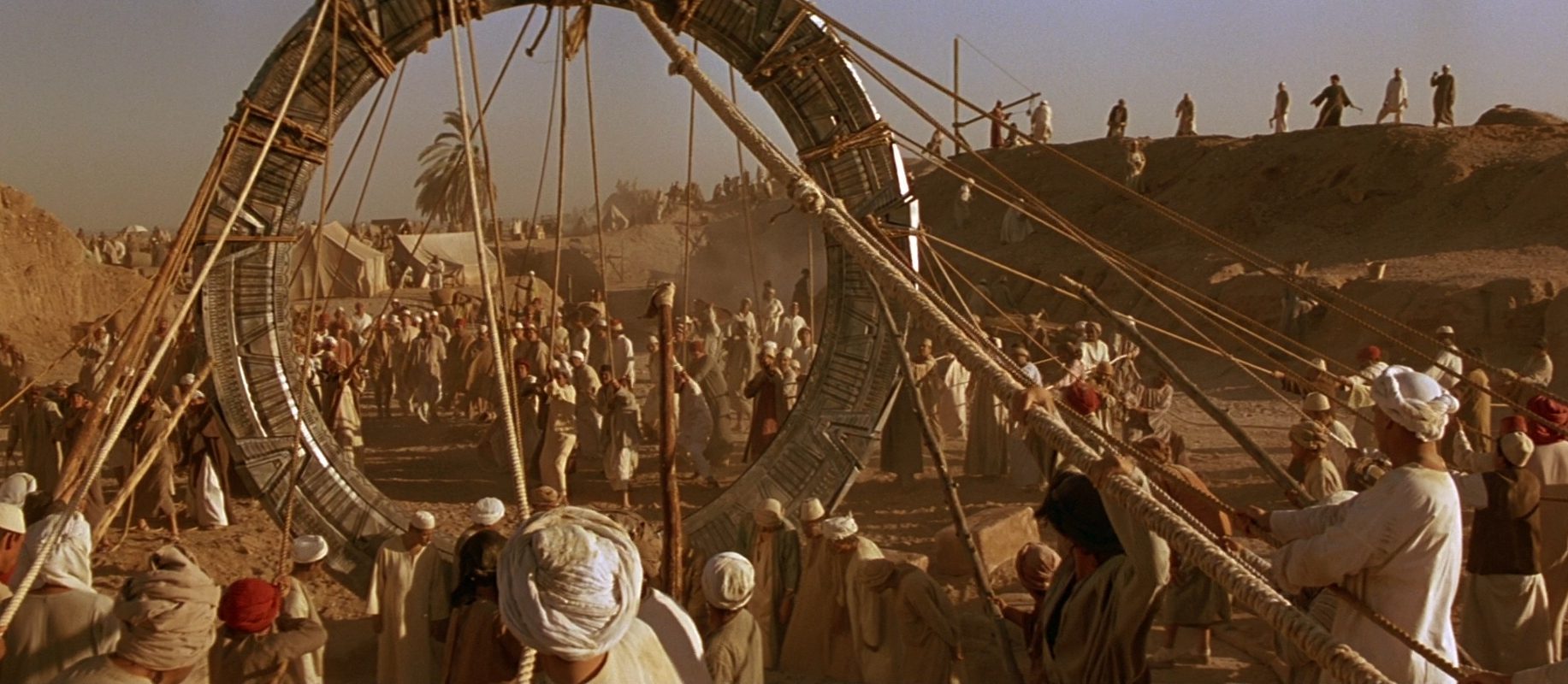
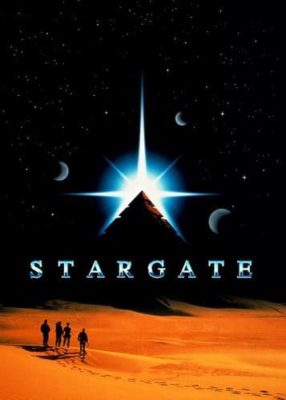
“Well, that would have been an excellent reason to shoot everyone.”
Since Stargate became a sleeper hit in 1994, a little cottage industry multimedia franchise has blossomed in its shadow, garnering an impressive following through numerous spin-off television series, direct-to-video sequels, video games, comic books, and novels. The shows, particularly Stargate SG-1, have eclipsed the original film in terms of popularity, but it all started with this ambitiously campy sci-fi actioner from the minds of Roland Emmerich and Dean Devlin. Mixing kitschy interpretations of Egyptian mythology with overtones of Scientology and blending them together with reheated Star Trek leftovers, Stargate is a pleasurable escapist fantasy that succeeds because it embraces its ridiculousness. It boasts an undiminished sense of adventure that is gamely upheld by stars James Spader and B movie legend Kurt Russell, firmly planting a flag in the realm of brainless fun. But approached with an empty mind and charitable spirit, it proves to be a cheerful romp from beginning to end; one that has been subtly influential on the modern sci-fi blockbuster.
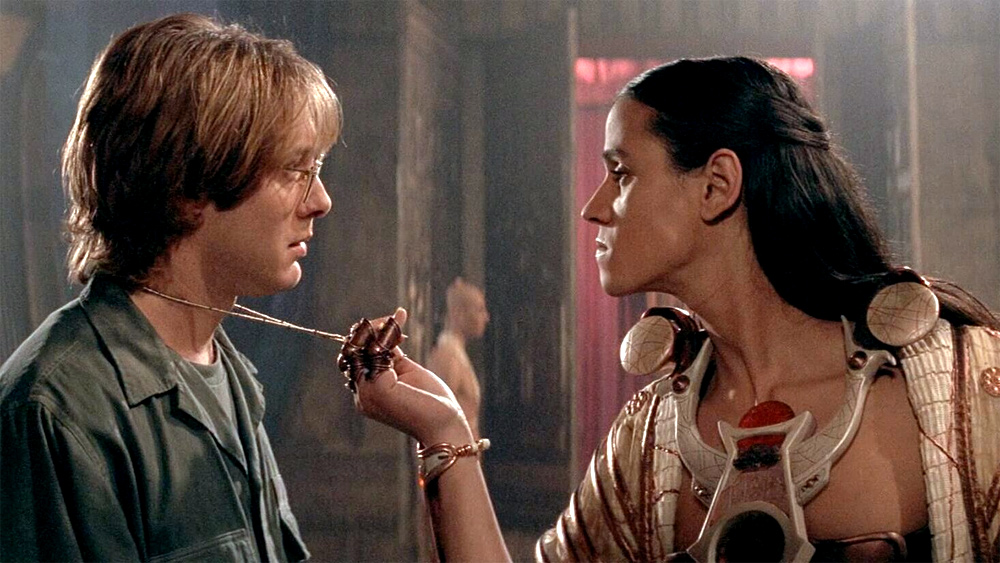
There’s a thin veneer of mythological allure that gives Stargate its modicum of groundedness. Dr. Daniel Jackson (Spader) is an Egyptologist, knowledgeable in hieroglyphics and ancient languages. He’s spent his entire young career researching, connecting dots, and hypothesizing, and opens the film presenting his ideas to a panel of experts and respected contemporaries. The room empties with echoes of laughter when Jackson postulates that aliens built the pyramids. The sole remaining member of his audience, Catherine Langford (Viveca Lindfors), approaches him with the opportunity to decipher the cryptic markings on an artifact that her father had discovered in Giza in 1928. She requests Jackson’s expertise because she believes that he’s right, having witnessed the discovery of coverstones that predate Egyptian history when she was a young girl. Given access to classified military information, he dons his thinking cap for a few weeks. His working theory is that the coverstone he has analyzed suggests the existence of a “stargate” that uses constellations as coordinates to travel through wormholes. He’s correct, of course. We’ve seen the alien device as it was unearthed in the film’s prologue.
The excitement kicks up a notch once Jackson sticks his face through the stargate, which the military has kept hidden all this time, waiting on someone of Jackson’s caliber to decipher the coordinate system and activate it. Transported to a planet on the other side of the known universe, Jackson is joined by Colonel O’Neil (Russell), a flat-topped tough guy who heads up a special task force. By this point, we’ve learned all that we will about our leads—Jackson is the dorky genius with a weak immune system and a severe lack of common sense trying to save his career by proving his conspiracy theories correct; O’Neil is the jaded soldier haunted by the tragic death of his son, resigned that he may never return to his home planet.
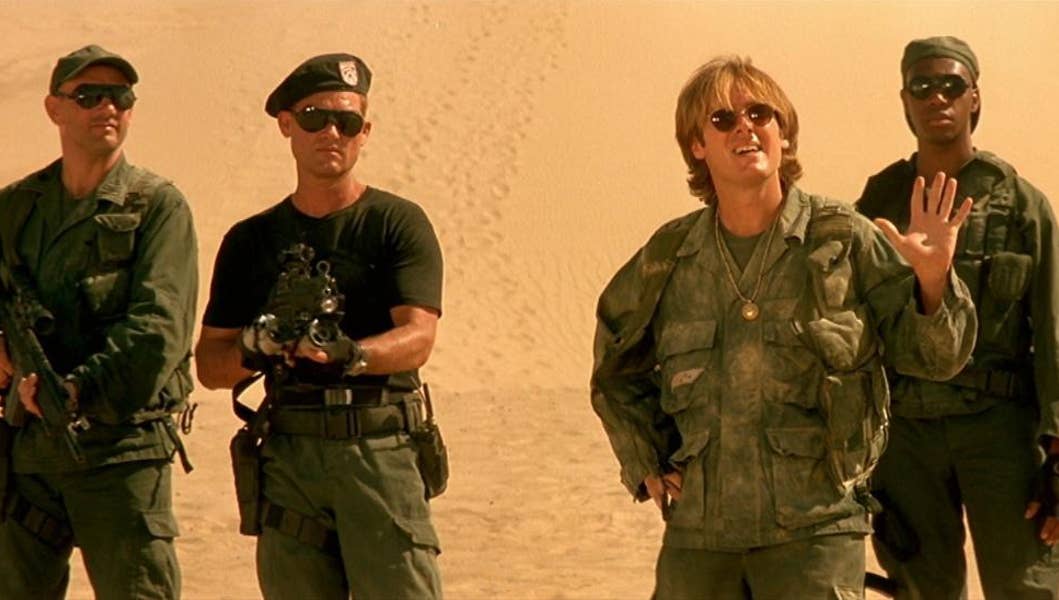
They’re transported into a pyramid-like structure in the middle of a desert on a planet with three moons. Jackson determines that they cannot travel back to earth without a new set of coordinates which he believes can be found somewhere on this alien planet, adding a hint of desperation to the reconnaissance mission. The team stumbles across a group of humans slaving away at a large mining operation. Using an ancient Egyptian dialect, Jackson is able to rudimentarily communicate with some of the miners who begin bowing before him, believing that he is an emissary of their god, the Egyptian god of the sun, Ra. The clan chieftain (Erik Avari) offers his daughter Sha’uri (Mili Avital) as a gift to Jackson, which Jackson initially refuses, but eventually romantic interest forms. O’Neil finds himself connecting with Skaara (Alexis Cruz), the chieftain’s son, which helps him process the loss of his own son. After some covert research, Jackson discovers that Ra is indeed an alien, and that he had traveled to earth during the Ancient Egypt era in search of human bodies to possess in order to prolong his own life. Humans on earth, enslaved by overseers left there by Ra, revolted and buried their stargate to prevent Ra’s return. Humans on Abydos, however, began to worship Ra as their god while harvesting a rare mineral that keeps him alive and powers his technology.
We eventually meet Ra (Jaye Davidson), the sky god Anubis (Carlos Lauchu) and the falcon god Horus (Djimon Hounsou). Multiple shootouts ensue, a bomb is discovered, and Jackson gets killed and then resurrected by a magical regenerative sarcophagus. Their false gods revealed, the tribal people of Abydos revolt and help the O’Neil and co. defeat Ra’s forces. It’s a ridiculous climax that doesn’t quite seem to fit the preceding material but is fun nonetheless.
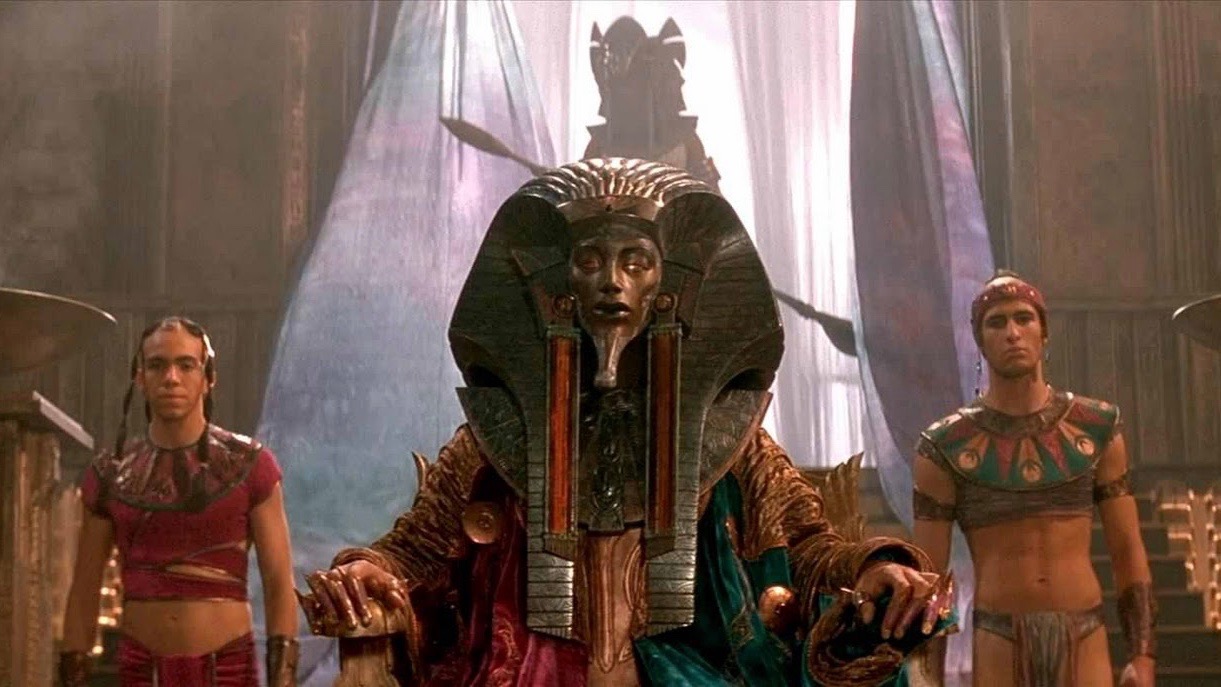
Stargate could easily have been terrible. It was panned by critics, including Roger Ebert who gave it a single star review. But coming from the George Lucas school of big ideas and fun effects, I think it works quite well. There are several elements working in conjunction to achieve the unique but familiar feel of the film. First and foremost is the star power of Russell and Spader, who both initially scoffed at the goofy script but were persuaded to participate by Emmerich’s enthusiasm for the project and a juicy contract, respectively. Looking like a shabby John Lennon, Spader’s tongue-in-cheek performance is perfectly suited to the film’s high-spirited aspirations and prevents any threat of devolution into self-seriousness. Russell’s previous outings in films like The Thing and Escape from New York connotate a history of experience and authority. Another fruitful decision was the casting of Jaye Davidson as Ra. Fresh off an Oscar nomination for his gender-bending role in The Crying Game, Davidson’s androgynous appearance gives his alien character an aura of mystery.
I think it’s fair to criticize the film’s plot for trending toward the generic—why they thought firefights and a bomb countdown were a fitting ending is a valid question—and there are several drastic logic gaps, but all this is water under the bridge because we get swept up by the film’s narrative momentum. Like other films of its vintage, Stargate is conveyed through ideas and images rather than precise plotting and dialogue. In this regard, I think it compares favorably to the films of James Cameron and some of Spielberg’s more fantastical works.
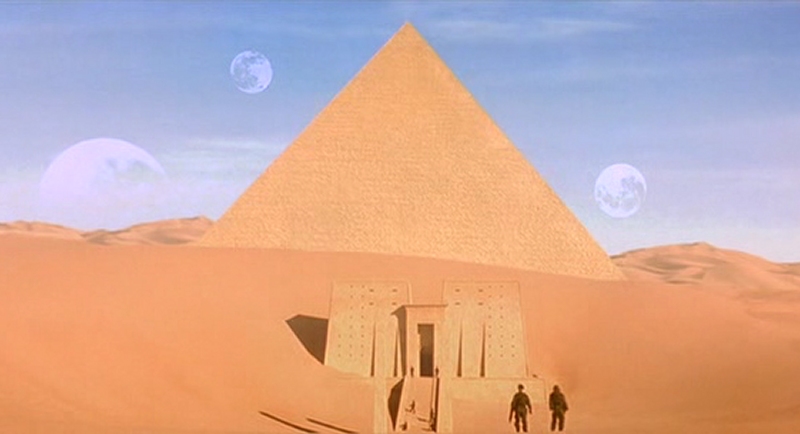
I found the thematic intrigue to be as effective as most high concept blockbusters and the effects work to be quite charming. The abundance of Egyptian influences create an alluring universe, one that at least tries to tie itself to the reality we know. The costuming of the Egyptian gods looks great, augmented by some really neat animatronic mechanisms that were produced by artist Patrick Tatopoulos and light, but impressive, CGI. Stargate was produced on the cusp of the CGI era and features a mix of techniques. There are a few moments that look dated now—with the exception of the morphing helmets, which I think still hold up—but there are even more moments of clever practical effects that fall somewhere between endearing and excellent. The Clydesdale horse dressed up in prosthetics to appear as an alien creature, the drone-like vehicles that zip through the sky, the spiraling explosion of the opened stargate—it all holds up very well. There’s also a superlative use of miniatures in which the pyramid-spaceship opens up, which we view from the interior, capturing an impressive sense of scale.
Stargate has understandably been overshadowed by the spin-offs, but it still has plenty of merit in terms of theme, premise, and aesthetics. Although I’m possibly revealing a knowledge gap, it seems like it kickstarted a trend of military/sci-fi conspiracy stories, especially in video games, though also surfacing in films like Prometheus and Indiana Jones and the Kingdom of the Crystal Skull. Less serious than Roland Emmerich’s later films (Independence Day, The Day After Tomorrow) and better for it, Stargate is a forgotten gem of camp sci-fi.
Sources:
“STARGATE (1994) Retrospective / Review”. Youtube, Oliver Harper. 14 May 2017.